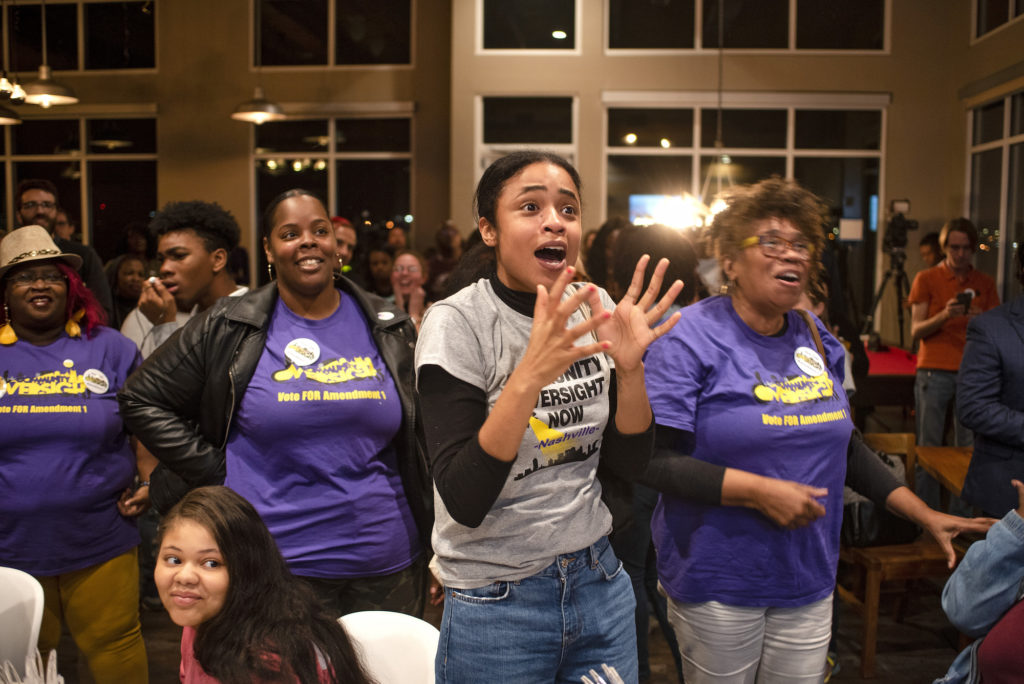
Nashville voted resoundingly on Tuesday to create a citizen board to review allegations of police misconduct, capping a grassroots campaign that first used a petition drive to get the proposal on the ballot and then won 59 percent of the vote.
Amendment 1 will require Metro to create the 11-member review board by the end of January, to allocate an annual budget of at least $1.5 million, and to hire nine full-time staff — including investigators — to carry out reviews of allegations and police policies.
Calling the moment “historic” for Nashville, the Community Oversight Now coalition said the moment completed a decades-long struggle that had tried unsuccessfully to create similar boards in the 1970s and 1990s.
“It is a celebration of the spirit of nonviolence, racial equity, and participatory governance for many people, who for too long, have stood with their backs to the wall,” the coalition wrote in a statement. “It offers new opportunities to unite and bring accountability to Nashville.”
The push for community oversight intensified in recent years following fatal shootings by Nashville officers, and an extensive analysis that showed how aggressive traffic stop tactics were disproportionately impacting black drivers.
Voter Jerrold Smith helped pass the ballot measure, noting that while he supports “99 percent of police officers,” he said he believes independent oversight is needed for incidents like shootings.
“There is an element in the police force where you see minorities being shot … there’s a disparity between the way that some suspects are apprehended,” Smith said. “When a shooting happens and it’s not justified, somebody needs to speak on it.”
This is beautiful. Proud to have voted with
@OversightNow to create a community oversight board tasked with ensuring accountability in the Metro Nashville PD.
https://t.co/UKtLZDeBmR— R. Andrew Free (@ImmCivilRights)
November 7, 2018
The proposal drew strong support from black voters in Nashville, including 20-year-old Kiyala Hatcher, of Hermitage, who said it was her primary reason for voting.
“It would be helpful if we can have people be held accountable for their actions and not just a slap on the wrist,” she said. “I feel like it’ll put a lot of people at ease.”
Nashville Mayor David Briley, who did not support Amendment 1, released a statement vowing to carry out its mandate.
“The people of Nashville have spoken,” he wrote. “I have always asserted that civilian oversight is essential to ensuring that we have a 21st-century approach to policing … and I will do all I can to help ensure the Community Oversight Board is successful.”
Briley had raised concerns about the makeup of the 11-member panel — which does not include law enforcement representatives — and its placement in the Metro Charter, which is difficult to modify to accommodate revisions.
A similar message came late Tuesday from the Fraternal Order of Police, which had fought aggressively against the ballot measure, including funding several TV ads. The group said it will respect the law while reiterating its “very sincere concerns about the many flaws that exist in the language of this legislation.”
Officials have said that the timeline to create the board will require quick action by the Metro Council, and financial allocations outside of the normal budget process. But Briley said he would begin working with the board as early as next week.
Most Amendments Approved
Meanwhile, Davidson County also approved four other charter amendments:
- a modified succession plan for the role of mayor, allowing the council to choose a “temporary” mayor in any instance when a vice mayor is unable or unwilling to serve;
- an update to when special elections are held;
- a requirement that officials swear an oath to the Charter when elected;
- and a rewrite of the Charter to use of gender-neutral pronouns throughout.
However, voters rejected Amendment 5, which sought to allow council members to run for a third term. That marks the third time that Davidson County residents have rejected such an attempt, this time with 54 percent opposed.


